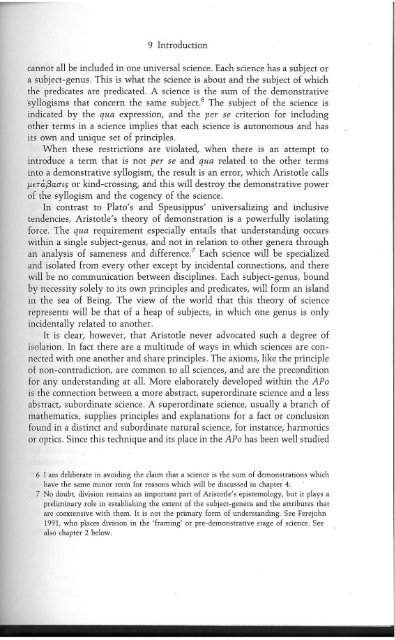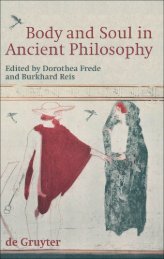- Page 1 and 2: MALCOLM WILSONAristotle's Theoryof
- Page 3 and 4: PHOENIXJournal of the Classical Ass
- Page 5 and 6: @ University of Toronto Press Incor
- Page 7: vi ContentsCHAPTER 3, ANALOGY AND D
- Page 11 and 12: x AbbreviationsOther WorksLSj H.G.
- Page 14 and 15: INTRODUCTIONAristotle is renowned f
- Page 16: 5 Introductionthe one that 5,0 succ
- Page 19: 8 Aristotle's Theory of the Unity o
- Page 23 and 24: 12 Aristotle's Theory of the Unity
- Page 25 and 26: Genus, Abstraction,and Commensurabi
- Page 27 and 28: 16 Aristotle's Theory of the Unity
- Page 29 and 30: 18 Aristotle's Theory of the Unity
- Page 31 and 32: 20 Aristotle's Theory of the Unity
- Page 33 and 34: 22 Aristotle's Theory of the Unity
- Page 35 and 36: 24 Aristotle's Theory of the Unity
- Page 37 and 38: 26 Aristotle's Theory of the Unity
- Page 39 and 40: 28 Aristotle's Theory of the Unity
- Page 41 and 42: 30 Aristotle's Theory of the Unity
- Page 43 and 44: 32 Aristotle's Theory of the Unity
- Page 45 and 46: 34 Aristotle's Theory of the Unity
- Page 47 and 48: 36 Aristotle's Theory of the Uniry
- Page 49 and 50: 38 Aristotle's Theory of the Unity
- Page 51 and 52: 40 Aristotle's Theory of the Uniry
- Page 53 and 54: 42 Aristotle's Theory of the Unity
- Page 55: 44 Aristotle's Theory of the Unity
- Page 58 and 59: 47 Genus, Abstraction, and Commensu
- Page 60 and 61: 49 Genus, Abstraction, and Commensu
- Page 62 and 63: 51 Genus, Abstraction, and Commensu
- Page 64 and 65: 2Analogy In Aristotle's BiologyProb
- Page 66 and 67: 55 Analogy in Aristotle's Biologysu
- Page 68 and 69: 57 Analogy in Aristotle's Biologyth
- Page 70 and 71:
59 Analogy in Aristotle's Biologybi
- Page 72 and 73:
61 Analogy in Aristotle's Biologyto
- Page 74 and 75:
63 Analogy in Aristotle's Biologypa
- Page 76 and 77:
65 Analogy in Aristotle's Biologyof
- Page 78 and 79:
67 Analogy in Aristotle's Biologyan
- Page 80 and 81:
69 Analogy in Aristotle's Biology3.
- Page 82 and 83:
to make them analogues 171 Analogy
- Page 84 and 85:
73 Analogy in Aristotle's BiologyWe
- Page 86 and 87:
75 Analogy in Aristotle's Biologyju
- Page 88 and 89:
77 Analogy in Aristotle's Biologyqu
- Page 90 and 91:
79 Analogy in Aristotle's Biologyco
- Page 92 and 93:
81 Analogy in Aristotle's BiologyPA
- Page 94 and 95:
83 Analogy in Aristotle's Biologyth
- Page 96 and 97:
85 Analogy in Aristotle's Biologydi
- Page 98:
87 Analogy in Aristotle's Biologyth
- Page 101 and 102:
90 Aristotle's Theory of the Unity
- Page 103 and 104:
92 Aristotle's Theory of the Unity
- Page 105 and 106:
94 Aristotle's Theory of the Unity
- Page 107 and 108:
96 Aristotle's Theory of the Uniry
- Page 109 and 110:
98 Aristotle's Theory of the Unity
- Page 111 and 112:
100 Aristotle's Theory of the Unity
- Page 113 and 114:
102 Aristotle's Theory of the Unity
- Page 115 and 116:
104 Aristotle's Theory of the Unity
- Page 117 and 118:
106 Aristotle's Theory of the Unity
- Page 119 and 120:
108 Aristotle's Theory of the Unity
- Page 121 and 122:
110 Aristotle's Theory of the Unity
- Page 123 and 124:
112 Aristotle's Theory of the Unity
- Page 125 and 126:
114 Aristotle's Theory of the Unity
- Page 127 and 128:
4The Structure of Focality'Focal me
- Page 129 and 130:
118 Aristotle's Theory of the Unity
- Page 131 and 132:
120 Aristotle's Theory of the Unity
- Page 133 and 134:
122 Aristotle's Theory of the Unity
- Page 135 and 136:
124 Aristotle's Theory of the Unity
- Page 137 and 138:
126 Aristotle's Theory of the Unity
- Page 139 and 140:
128 Aristotle's Theory of the Unity
- Page 141 and 142:
130 Aristotle's Theory of the Unity
- Page 143 and 144:
132 Aristotle's Theory of the Unity
- Page 145 and 146:
5Metaphysical FocalityOur study of
- Page 147 and 148:
136 Aristotle's Theory of the Unity
- Page 149 and 150:
138 Aristotle's Theory of the Unity
- Page 151 and 152:
140 Aristotle's Theory of the Unity
- Page 153 and 154:
142 Aristotle's Theory of the Unity
- Page 155 and 156:
144 Aristotle's Theory of the Unity
- Page 157 and 158:
146 Aristotle's Theory of the Unity
- Page 159 and 160:
148 Aristotle's Theory of the Unity
- Page 161 and 162:
150 Aristotle's Theory of the Unity
- Page 163 and 164:
152 Aristotle's Theory of the Unity
- Page 165 and 166:
154 Aristotle's Theory of the Unity
- Page 167 and 168:
156 Aristotle's Theory of the Unity
- Page 169 and 170:
158 Aristotle's Theory of the Unity
- Page 171 and 172:
160 Aristotle's Theory of the Unity
- Page 173 and 174:
162 Aristotle's Theory of the Unity
- Page 175 and 176:
164 Aristotle's Theory of the Unity
- Page 177 and 178:
166 Aristotle's Theory of the Unity
- Page 179 and 180:
168 Aristotle's Theory of the Unity
- Page 181 and 182:
170 Aristotle's Theory of the Unity
- Page 183 and 184:
172 Aristotle's Theory of the Unity
- Page 185 and 186:
174 Aristotle's Theory of the Unity
- Page 187 and 188:
176 Aristotle's Theory of the Unity
- Page 189 and 190:
178 Aristotle's Theory of the Unity
- Page 191 and 192:
180 Aristotle's Theory of the Unity
- Page 193 and 194:
182 Aristotle's Theory of the Unity
- Page 195 and 196:
184 Aristotle's Theory of the Unity
- Page 197 and 198:
186 Aristotle's Theory of the Unity
- Page 199 and 200:
188 Aristotle's Theory of the Unity
- Page 201 and 202:
190 Aristotle's Theory of the Unity
- Page 203 and 204:
192 Aristotle's Theory of the Unity
- Page 205 and 206:
194 Aristotle's Theory of the Unity
- Page 207 and 208:
196 Aristotle's Theory of the Unity
- Page 209 and 210:
198 Aristotle's Theory of the Unity
- Page 211 and 212:
200 Aristotle's Theory of the Unity
- Page 213 and 214:
202 Aristotle's Theory of the Unity
- Page 215 and 216:
204 Aristotle's Theory of the Unity
- Page 217 and 218:
206 Aristotle's Theory of the Unity
- Page 219 and 220:
208 Aristotle's Theory of the Unity
- Page 221 and 222:
210 Aristotle's Theory of the Unity
- Page 223 and 224:
212 Aristotle's Theory of the Unity
- Page 225 and 226:
214 Aristotle's Theory of the Unity
- Page 227 and 228:
216 Aristotle's Theory of the Unity
- Page 229 and 230:
218 Aristotle's Theory of the Unity
- Page 231 and 232:
220 Aristotle's Theory of the Unity
- Page 233 and 234:
222 Aristotle's Theory of the Unity
- Page 235 and 236:
224 Aristotle's Theory of the Unity
- Page 237 and 238:
226 Aristotle's Theory of the Unity
- Page 239 and 240:
228 Aristotle's Theory of the Unity
- Page 241 and 242:
230 Aristotle's Theory of the Unity
- Page 243 and 244:
232 Aristotle's Theory of the Unity
- Page 245 and 246:
234 Aristotle's Theory of the Unity
- Page 247 and 248:
236 Aristotle's Theory of the Unity
- Page 249 and 250:
238 Aristotle's Theory of the Unity
- Page 251 and 252:
240 Aristotle's Theory of the Unity
- Page 253 and 254:
242 Aristotle's Theory of the Unity
- Page 255 and 256:
244 BibliographyJaeger, W. 1957. Ar
- Page 257 and 258:
246 BibliographyCherniss, H. 1944.
- Page 259 and 260:
248 BibliographyGrene, M. 1974. ' I
- Page 261 and 262:
250 BibliographyBioiogie, logique e
- Page 263 and 264:
252 BibliographyRoss, W.D. 1914. Re
- Page 266 and 267:
INDEX LOCORUMCat. 1.4 73b9-10 1501
- Page 268 and 269:
257 Index LocorumVnA 39-41, n.3 414
- Page 270 and 271:
259 Index Locorum11.8 653b35 65n21,
- Page 272 and 273:
261 Index LocorumE.1 1025b3G-- 2.4
- Page 274:
263 Index LocorumVIII.1 1155b13- 16
- Page 277 and 278:
266 General Indexartefact 186ascidi
- Page 279 and 280:
268 General Indexdemarcation of gen
- Page 281 and 282:
270 General Indexpractical wisdom 1
- Page 284 and 285:
PHOENIX SUPPLEMENTARY VOLUMES1 Stud
- Page 286:
36 The Atomists: Leucippus and Demo





![[Niall_Livingstone]_A_Commentary_on_Isocrates'_Busiris](https://img.yumpu.com/51449110/1/163x260/niall-livingstone-a-commentary-on-isocrates-busiris.jpg?quality=85)

![[Richard_Sorabji]_Self__Ancient_and_Modern_Insigh(BookFi.org)](https://img.yumpu.com/30857691/1/174x260/richard-sorabji-self-ancient-and-modern-insighbookfiorg.jpg?quality=85)





